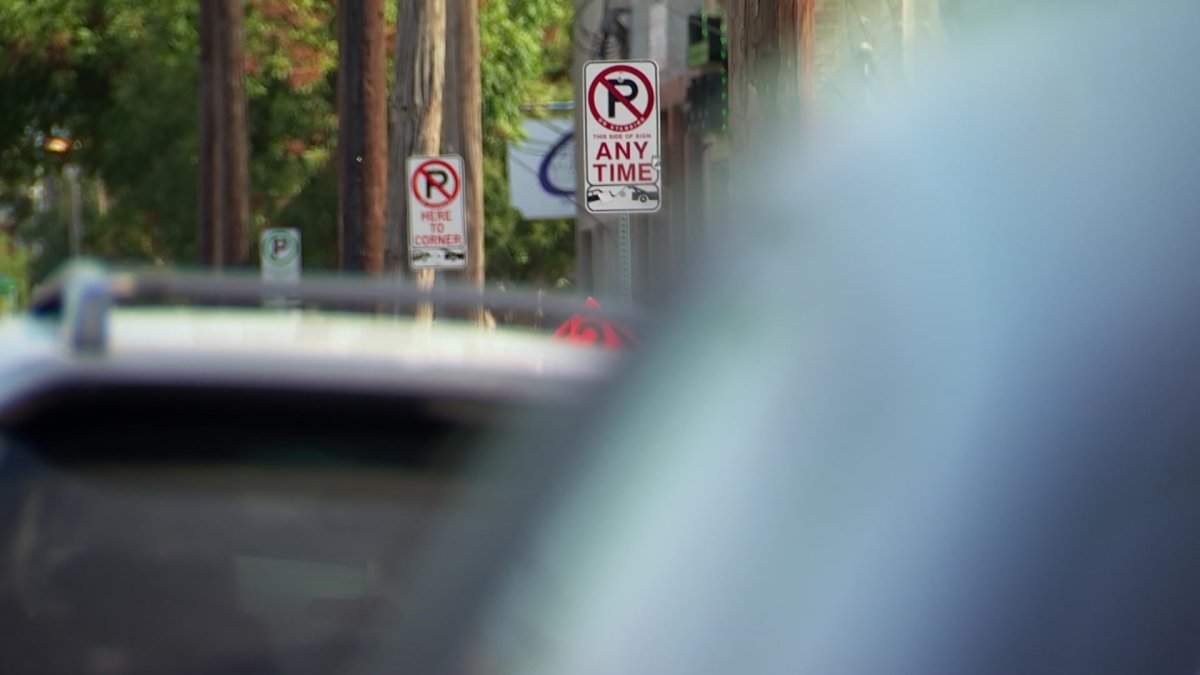
A Dallas curb lane management study is underway that could reduce street parking in favor of other uses for that space.
A Dallas curb lane management study is underway that could reduce street parking in favor of other uses for that space.
The study currently includes Downtown, Uptown, Deep Ellum and Bishop Arts but could expand in the future.
It demonstrates changes taking place in the Dallas urban core, where thousands of residents now live in big new apartments and fewer people just drive into the city.
“I think Dallas has really changed in the last five years I would say,” said resident Quenita Fagan.
Get DFW local news, weather forecasts and entertainment stories to your inbox. Sign up for NBC DFW newsletters.
She was eating outside a Starbucks at the corner of Commerce and Akard Street Thursday, across from the new AT&T Discovery District.
Drivers can’t just pull up and park there on Commerce. Curbside restrictions include valet drop-off zones and bus lanes. Along with bike lanes those are the sort of restrictions that could expand to many other locations with the curb lane management study.
Fagan said visitors from outside the downtown area are drawn to many attractions but she uses public transportation and would prefer to see fewer cars.
Local
The latest news from around North Texas.
“The attractions are here, but how to make that work for everyone, letting them know that there are people that live here. And we don’t want cars everywhere,” Fagan said.
The Curb Lane Management Study was a topic at the Dallas City Council Transportation Committee meeting this week.
Council Member Cara Mendelsohn said businesses could suffer from reducing street parking because she and other residents count on using it. Mendelsohn said public transportation would require three to four times longer so she drives from North Dallas.
“Frankly there's times I've pulled up and there's no parking. Can't get into valet, and you know what? I'm going to head home. So, we can’t give up on parking,” Mendelsohn said.
Other members of the Committee supported changes, including Transportation Chairman Omar Narvaez.
“I want to do this. I think that we have to get this infrastructure in for dedicated bus lanes, motorcycle, moped, bike parking. If we don’t add this infrastructure in, the residents of Dallas will, one, not get used to it. And we’ll never get there. And I believe that we, as the ninth-largest city, are probably a good 10 to 15 years behind other major cities that have implemented this a long time ago,” Narvaez said.
Deep Ellum, where big new apartment structures have recently been completed, is an example of where change is already happening.
Elm Street recently got wider, landscaped sidewalks a few years ago replacing some parking space.
“The Stack” office building recently opened with a big parking garage that is available to Deep Ellum visitors at night, helping remove the need for street spaces.
Commerce Street is soon to receive reconstruction, which will include the first dynamic loading zones in Dallas curbside space.
“At night they’re used for rideshare patrons and during the day they’re used for important business needs such as FedEx and food vendor deliveries. And that’s because we know we have to maximize and share the use of the curb. It’s an important asset,” said Deep Ellum Foundation Executive Director Stephanie Keller-Hudiburg.
Dallas is also considering a return of shared scooters that became a problem when they were forbidden in 2020. Scooters will get dedicated curbside parking areas to limit the nuisance when they are allowed again, Keller-Hudiburg said.
“We’re learning. We have to be adaptable to the needs as they are changing. For example, rideshares, scooters, all of these things that demand use of the curb and we have to be able to adapt to those needs,” she said.
Some drivers are not convinced. Juan Garcia got one of the few curbside street parking spaces on Elm Street near the triple underpass tourist zone.
Garcia said he supports public transportation, but it is not heavily used in Dallas and more bus lanes are not needed.
“We don't have that culture, like in Europe, or other places,” Garcia said. “I think they are trying to create a culture where there is none.”
There will be public input on the results of this study before changes are made.